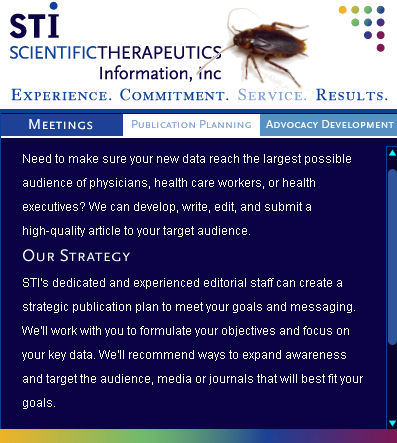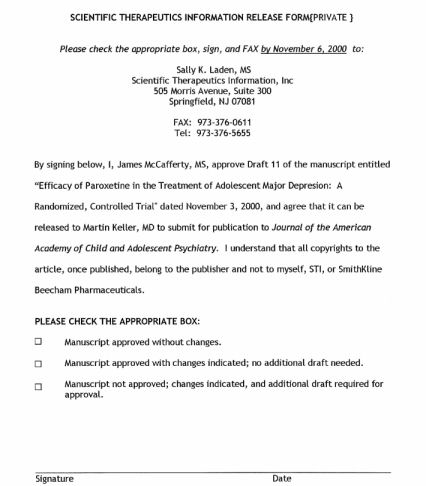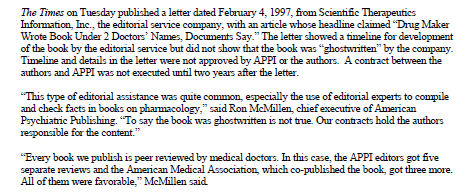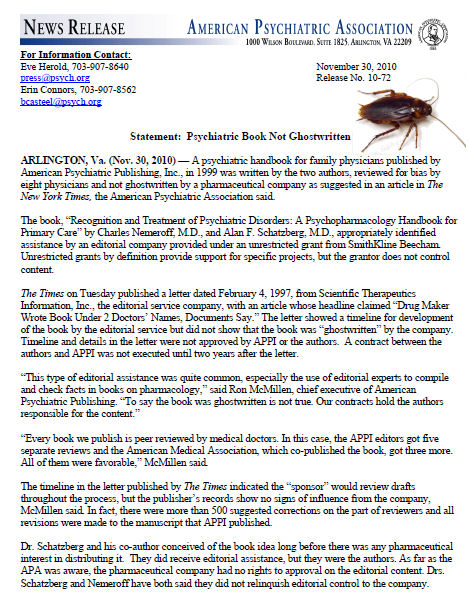For every roach you see, there are a hundred behind the walls.
Yesterday’s article in the New York Times [Drug Maker Wrote Book Under 2 Doctors’ Names, Documents Say] was about Dr. Charles Nemeroff, a person of specific interest to me, so I jumped on the Nemeroff aspect of the story [a “quintessential resource”…], but that’s not the real center of things. That New York Times article was in response to a letter from the Project on Government Oversight to Dr. Francis Collins, Director of the National Institutes of Health [POGO Letter to NIH on Ghostwriting Academics]. In that letter, POGO Executive Director Danielle Brian and Investigator Paul Thacker document five cases where a Marketing Firm, Scientific Therapeutics Information, ghost wrote scientific presentations, articles, and books that were published by expert physicians – all was under the direction of the Pharmaceutical Manufacturer, GlaxoSmithKline.
Before listing the examples, I just want to highlight how "not okay" all of this is. We’re used to "marketing" "advertising" in our daily lives. Glossy ads interrupt our reading and media viewing at every possible juncture – even popping up on our web pages. But science, particularly medical science, is something else. Simply put, you don’t want your physician prescribing a medicine for you to take based on the jillion ad brochures he/she receive every day designed to increase the manufacturers profits. You want that prescription to represent the best, safest, unbiased information available for the medical condition you actually have. That’s why reputable medical journals require that the researcher display the data that supports the conclusions in detail. So Scientific Therapeutics Information is a very unusual company indeed – an Ad Agency for scientific data:

reformatted from http://www.stimedinfo.com/service02.htm
According to the documents, GSK began to push sales of Paxil in the early 1990s with an extensive ghostwriting program run by the marketing firm Scientific Therapeutics Information (STI). For instance, STI wrote a proposal to organize GlaxoSmithKline’s Paxil Advisory Board Meeting in 1993 at the Ritz Carlton Hotel in Palm Beach, Florida. STI chose Dr. Charles Nemeroff of Emory University as their speaker to lay out the meeting’s agenda and objectives. Dr. Nemeroff apparently led discussions on how to “evaluate clinical research/promotional programs” and “generate information for use in promotion/education.” [Attachment A]
Drs. Dwight Evans and Dennis Charney
NIH funding since FY 2006: $30.6 million
NIH funding FY 2010: $10,929,790According to the documents, Sally Laden of STI wrote an editorial for Biological Psychiatry in 2003 for Drs. Dwight Evans, Chairman of the Department of Psychiatry at the University of Pennsylvania School of Medicine, and Dennis Charney, then an employee at the NIH and now Dean of Research at the Mt. Sinai School of Medicine at New York University.
In an email to a GSK employee, Ms. Laden wrote, “Is there a problem with my invoice for writing Dwight Evans’ editorial for the [Depression and Bipolar Support Alliance]’s comorbidity issue to Biological Psychiatry?” [Attachment B] Yet, when published, the “authors” Evans and Charney only stated, “We acknowledge Sally K. Laden for editorial support.” [Attachment C]
Dr. Kimberly Yonkers
NIH funding since FY 2006: $6.4 million
NIH funding FY 2010: $1,241,257
In 2002, a GSK employee emailed Dr. Yonkers of Yale School of Medicine, writing, “Attached please find the poster to be presented at the US Psych Congress. Please provide feedback.” [Attachment G] Other documents make it clear that Dr. Yonkers was provided at least one ghostwritten study. For instance, the cover page for a study on Paxil to be published in Psychopharmacology Bulletin notes that “Draft I” was prepared by Sally Laden and another STI employee. The top line of the draft even reminds Dr. Yonkers to remove evidence of STI’s involvement, stating, “STI Cover Page—To be removed before submission.” [Attachment H] When the study was later published, it notes that it was funded by an “unrestricted educational grant” from GSK, but makes no mention of STI’s involvement in the paper. [Attachment I]
Dr. Martin Keller
NIH funding since FY 2006: $7.0 million
NIH funding FY 2010: $1,341,493Finally, we would like to turn your attention to Dr. Martin Keller of Brown University Medical School. In July 2001, Dr. Keller and several colleagues published a widely read study, called Study 329, on the efficacy of Paxil (paroxetine) to treat adolescent major depression.[8] Study 329 concluded, “The findings of this study provide evidence of the efficacy and safety of the SSRI, paroxetine, in the treatment of adolescent major depression.”[9]
Study 329, however, was clearly flawed—a mere two years later, the United Kingdom government warned British physicians to not prescribe Paxil for children due to fears of potential suicide.[10] In May 2004, our own FDA issued a similar warning.[11]
In early 2007, the BBC’s investigative program Panorama released a documentary on Paxil and Study 329.[12] The documentary publicized hundreds of secret emails from GSK, which were uncovered during litigation, that showed GSK knew years before the publication of Study 329 that Paxil did not provide efficacy in treating adolescents for depression.
With regards to Study 329 specifically, the BBC reported online about emails written by a company hired by GSK to provide PR for Study 329.[13] One email read, “Originally we had planned to do extensive media relations surrounding this study until we actually viewed the results.”[14] Another email read, “Essentially the study did not really show [Paxil] was effective in treating adolescent depression, which is not something we want to publicize.”[15] [Attachment J] The documentary also noted that Dr. Keller published Study 329 with the help of ghostwriter Sally Laden. In an email to Ms. Laden about Study 329, Dr. Keller wrote, “You did a superb job with this. Thank you very much. It is excellent. Enclosed are some rather minor changes from me…”[16] But before the final draft was released to Dr. Keller, Ms. Laden sent it to GSK for final approval so that the manuscript “can be released to Martin Keller, MD to submit for publication….” [Attachment K]

In June 2008, former Boston Globe reporter Alison Bass published Side Effects, a book that documents multiple problems with Dr. Keller’s research used in Study 329. Passages of the book discuss internal documents from Brown University regarding Dr. Keller’s research on Paxil. The documents were provided to Ms. Bass by Donna Howard, the former assistant administrator in Brown’s department of psychiatry. Ms. Howard said that data in Study 329 was changed to satisfy the study’s sponsor, GSK. According to Howard, “Everybody knew we had to keep [GlaxoSmithKline] happy and give them the results they wanted.”[17]
Even Brown University’s student newspaper, The Brown Daily Herald, published an exposé on Dr. Keller’s research and Study 329.[18] Dr. Keller refused to respond to questions from the paper. An editorial that accompanied this story stated, “We do believe that [Dr. Keller’s] actions directly affect the integrity of the University.”[19] Yet, despite the multiple public revelations, Brown University has done nothing.
POGO searched the NIH Reporter database of grants and was surprised to find that, despite all the repetitive controversy, Dr. Keller is still receiving NIH grants. Currently, he is the primary investigator on two NIH grants, with funding in 2010 of $1,341,493. Over the last five years, the NIH has given Dr. Keller $7 million in grants.[20]
I opened with "For every roach you see, there are a hundred behind the walls" for obvious reasons. This is an example of a practice that is surely more widespread than just this instance demonstrates. Paul Thacker has his work cut out for him, and he’s just the guy to do it.
The campaign of GSK to promote Paxil by disguising their advertisments as hard science published by identified experts while controlling the content through a professional marketing firm is more than just sleaze. The results were harmful to their customers – birth defects, suicides, addiction – genuinely bad things [so much for the old Hippocratic Oath "Do no harm"]. And the story reads like an old Greek Tragedy written with Aristotle’s formula from his Poetics. There’s a character flaw in the main character, apparent in the opening scene that festers and grows, ultimately bringing his tragic downfall at the end of the story. That would, of course, apply to Dr. Nemeroff who began by leading a sales strategy meeting and ended up a paid shill for GSK, bringing colleagues down with him. But it also applies to GSK and STI who started with a marketing strategy and ended up participating in corrupted research and fraud.
Says the American Psychiatric Association [recent past President: Alan Schatzberg]:
I paid my dues to the APA for a lot of years, so I feel I earned my right to rebut this silly Statement from the APA:

Unrestricted Grants from Pharmaceutical Companies were Charlie Nemeroff’s special area of expertise. He always makes this claim – that they come with no strings attached, no control. He got them by the bucketful while he was at Emory and used them for all kinds of perks – Grand Rounds speakers, sending residents to conferences, etc. The loophole is simple. They didn’t have to have any control, any strings. He was a willing co-conspirator already. They didn’t even have to say "you scratch my back and I’ll scratch yours." They were both already scratching, and simply having someone like him in charge of an academic department was worth plenty, no matter what he did with the money. This was how he kept himself so popular – deep pockets from "unrestricted grants." This argument isn’t evidence, it’s an indictment. I expect Schatzberg worked the same scam.

"The book sold about 26,000 copies, including 10,000 bought by SmithKline Beecham for American family doctors and 10,000 purchased by the Dutch pharmaceutical company Organon, Mr. McMillen said. The authors together received a 15 percent royalty of the $120,000 sales, or about $18,000, he said."[ref]

STI chose Dr. Charles Nemeroff of Emory University as their speaker to lay out the meeting’s agenda and objectives. Dr. Nemeroff apparently led discussions on how to “evaluate clinical research/promotional programs” and “generate information for use in promotion/education.” [Attachment A]

Hey Doc – can I borrow the book when you’re done with it cause I don’t want to put out the 30-some cents. LOL.
[…] ghostwriting. One of their examples was a textbook by Nemeroff and Schatzberg written in 1997 [see roaches…]. Well they went ballistic at being accused of ghostwriting and lawyered up. It was all kind of […]
[…] (2 December, 2010) – As suggested by the comment below, see also posts here and  here on the 1BoringOld Man blog. Also see an additional post by Dr Howard Brody on the Hooked: Ethics, […]